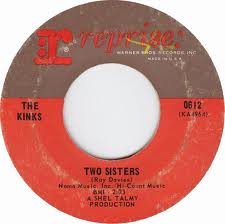Lyrics
In "Two Sisters", the singer compares sisters Sybilla and Percilla. Sybilla is a swinging, single "wayward lass", while Percilla is a married housewife. Percilla is tired of facing "the drudgery of being wed", with her being said to be "so jealous of her sister". The singer compares how "Sybilla looked into her mirror; Percilla looked into the washing machine" and how "Sybilla looked into the wardrobe; Percilla looked into the frying pan." Percilla then "threw away her dirty dishes just to be free again [and threw away] her women's weekly magazines just to be free again and put the children in the nursery just to be free again." However, upon seeing her children, she "decided she was better off" than her wild sister. She's "no longer jealous of her sister".
The two characters in the lyrics of "Two Sisters" (Sybilla and Percilla) were inspired by Ray Davies and his brother, Dave Davies. [4] [5] Ray was more introverted (and was the only one of the two married) while Dave was a party animal who was very outgoing. This clash of personalities was often the cause of many band in-fights, which would come out in their songs (ex. "Dandy", which is often thought to be about Dave).
Dave made up for both of us, he was the youthful, fun-loving one. 'Two Sisters' is quite accurate, in the sense that one had all the freedoms - one brother stays in, and the other goes out and has fun. And one resents the other for the ability to do it. But in the end, look what I've got...
This page is based on this
Wikipedia article Text is available under the
CC BY-SA 4.0 license; additional terms may apply.
Images, videos and audio are available under their respective licenses.
